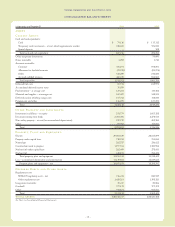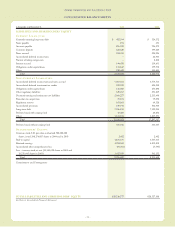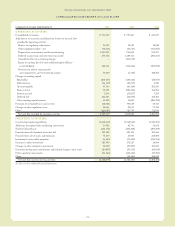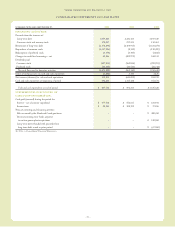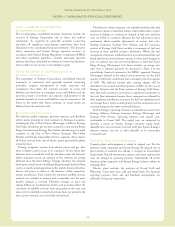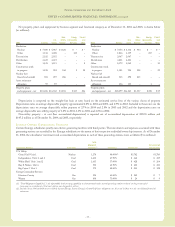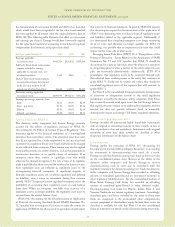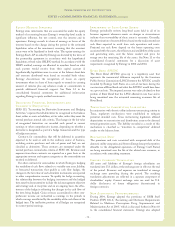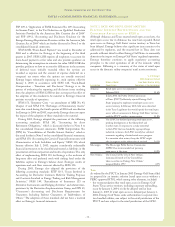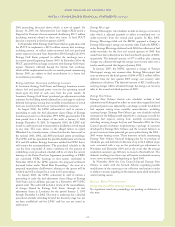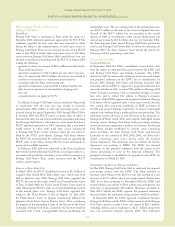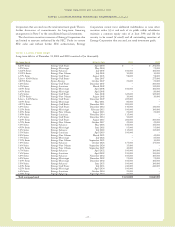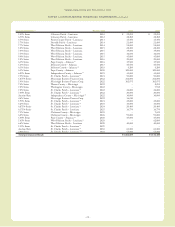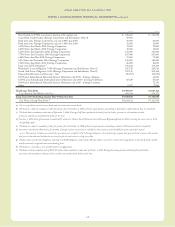Entergy 2004 Annual Report Download - page 61
Download and view the complete annual report
Please find page 61 of the 2004 Entergy annual report below. You can navigate through the pages in the report by either clicking on the pages listed below, or by using the keyword search tool below to find specific information within the annual report.
Entergy Corporation and Subsidiaries 2004
-59 -
FSP 109-1, “Application of FASB Statement No. 109, ‘Accounting
for Income Taxes’, to the Tax Deduction on Qualified Production
Activities Provided by the American Jobs Creation Act of 2004”
and FSP 109-2, “Accounting and Disclosure Guidance for the
Foreign Earnings Repatriation Provision within the American Jobs
Creation Act of 2004” which are further discussed in Note 3 to the
consolidated financial statements.
SFAS 123R, “Share-Based Payment” was issued in December of
2004 and is effective for Entergy at the beginning of the third
quarter in 2005. SFAS 123R requires all employers to account for
share-based payments at fair value and also provides guidance on
determining the assumptions to estimate fair value. SFAS 123R also
provides guidance on how to account for differences in the amounts
of deferred taxes initially recorded when the options are
recorded as expense and the amount of expense deducted on a
company’s tax return when the options are actually exercised.
Entergy began voluntarily expensing its stock options effective
January 1, 2003 in accordance with SFAS 148, “Stock-Based
Compensation - Transition and Disclosure.” Entergy is in the
process of evaluating the reporting and disclosure issues resulting
from the adoption of SFAS 123R but does not expect the effect of
the adoption of this standard to be material to Entergy’s financial
positionor results of operations.
SFAS 151, “Inventory Costs – an amendment of ARB No. 43,
Chapter 4” and SFAS 153, “Exchanges of Nonmonetary Assets,”
werealso issued during the fourth quarter of 2004 and are effective
for Entergy in 2006 and 2005, respectively. Entergy does not expect
the impact of the adoption of these standards to be material.
During 2003, Entergy adopted the provisions of the following
accounting standards: SFAS 143, “Accounting for Asset
Retirement Obligations,” which is discussed further in Note 8 to
the consolidated financial statements; FASB Interpretation No.
(FIN) 46, “Consolidation of Variable Interest Entities,” which is
discussed further in Note 5 to the consolidated financial statements;
and SFAS 150, “Accounting for Certain Financial Instruments with
Characteristics of both Liabilities and Equity.” SFAS 150, which
became effective July 1, 2003, requires mandatorily redeemable
financial instruments to be classified and treated as liabilities in the
presentation of financial position and results of operations.The only
effect of implementing SFAS 150 for Entergyis the inclusion of
long-term debt and preferred stock with sinking fund under the
liabilities caption in Entergy’s balance sheet. Entergy’s results of
operations and cash flows were not affected by SFAS 150.
During 2003, Entergy also adopted the provisions of the
following accounting standards: EITF 02-3, “Issues Involved in
Accounting for Derivative Contracts Held for Trading Purposes
and Contracts Involved in Energy Trading and Risk Management
Activities;” SFAS 149, “Amendment of Statement 133 on
DerivativeInstruments and Hedging Activities” and related inter-
pretations by the Derivatives Implementation Group, and FIN 45,
“Guarantor’s Accounting and Disclosure Requirements for
Guarantees Including Indirect Guarantees of Indebtedness of
Others.” The adoption of these standards did not have a material
effect onEntergy’sfinancial statements.
NOTE 2. RATE AND REGULATORY MATTERS
Electric Industry Restructuring and the
Continued Application of SFAS 71
Although Arkansas and Texas enacted retail open access laws, the
retail open access law in Arkansas has now been repealed. Retail
open access in Entergy Gulf States’ service territory in Texas has
been delayed. Entergy believes that significant issues remain to be
addressed by regulators, and the enacted law in Texas does not
provide sufficient detail to allow Entergy Gulf States to reasonably
determine the impact on Entergy Gulf States’ regulated operations.
Entergy therefore continues to apply regulatory accounting
principles to the retail operations of all of the domestic utility
companies. Following is a summary of the status of retail open
access in the domestic utility companies’ retail service territories.
%of Entergy’s
2004 Revenues Derived
Status of Retail from Retail Electric Utility
Jurisdiction Open Access Operations in the Jurisdiction
Arkansas Retail open access was repealed in
February 2003. 11.6%
Texas In July 2004, the Public Utility Commission
of Texas (PUCT)effectively rejected Entergy Gulf
States’ proposal to implement retail open access in its
service territory. In February 2005, bills were submitted
in the Texas Legislature that would specify that retail open
access will not commence in Entergy Gulf States’ territory
until the PUCT certifies a power region. 11.8%
Louisiana The LPSC has deferred pursuing retail open access,
pending developments at the federal level and
in other states. In response to a study submitted
to the LPSC that was funded by a group of large
industrial customers, the LPSC recently has solicited
comments regarding a limited retail access program.
It is uncertain what action, if any, the LPSC might
take in response to the information it received. 34.1%
Mississippi The Mississippi Public Service Commission
(MPSC) has recommended not pursuing
open access at this time. 10.9%
New Orleans The Council of the City of New Orleans,
Louisiana (Council or CityCouncil) has
taken no action onEntergy NewOrleans’
proposal filed in 1997. 4.5%
Texas
As ordered by the PUCT, in January 2003 Entergy Gulf States filed
its proposal for an interim solution (retail open access without a
FERC-approved RTO), which among other elements, included:
•the recommendation that retail open access in Entergy Gulf
States’ Texas service territory, including corporate unbundling,
occur by January 1, 2004, or else be delayed until at least
January1, 2007. If retail open access is delayed past January 1,
2004, Entergy Gulf States seeks authorization to separate into
two bundled utilities, one subject to the retail jurisdiction of the
PUCT and one subject to the retail jurisdiction of the LPSC.
NOTES to CONSOLIDATED FINANCIAL STATEMENTS continued



